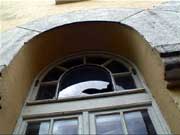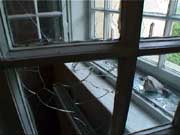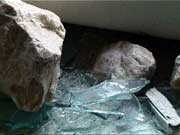Information Service of
the Serbian Orthodox Church
May 28, 2003
WHO WANTS TO EXPEL THE OLDEST SECONDARY
EDUCATION INSTITUTION FROM MONTENEGRO?
The St. Peter of Cetinje Seminary, formerly known as the School of Theology and
Education, represents the foundation of the entire Montenegrin school system. In its long
history since 1863 it has nurtured numerous and important workers in God's Church and
education, eminent cultural workers and parliamentary deputies. Among its instructors have
been metropolitans and writers and influential scholars. As such it is deeply interwoven
not only in the life of Montenegro and the Orthodox Metropolitanate of Montenegro and the
Littoral but, more broadly, in the life of Christian Europe.



In the year when the Seminary celebrates the 140th year since its founding, the most
recent attempt to murder a student forces us to ask ourselves whether the repeated stoning
of the restored Seminary, the physical attacks on its students, professors and their
children, are just a part of the screenplay to force the oldest educational and religious
institution from Montenegro. The facts are inexorable and they are, in brief, as follows:
- Prior to World War II the Seminary was located in Biljarda.
- With the advent of Communist rule in Cetinje on November 13, 1944, the Seminary building
in Biljarda was used by them for a brief interval (until February 1945) as a horse stable.
Thereafter, it was simply confiscated by force by the regime without any legal procedure.
- The Seminary stopped its work in 1944 and, since the Communist state regime prevented it
from resuming work, it formally ceased to exist in 1945.
For almost 50 years Montenegro was the only republic in the Yugoslav Federation without a
single religious school on its state territory.
- In 1992 the Metropolitanate of Montenegro and the Littoral restored the work of the
Seminary with the hope that it become the foundation of the general spiritual renaissance
of Montenegro.
- Expecting that the new post-Communist government would return the Seminary building in
Biljarda for the same purpose it served until World War II, the Seminary was temporarily
housed in the small and inadequate Church Court building, adapted for use as a day and
boarding school.
- Instead of returning the Biljarda building confiscated by the state, the Metropolitanate
was promised assistance in constructing a new building and Mr. Predrag Obradovic, the
Education Minister, announced that the Seminary, "the best school we have ever had in
Montenegro," would soon be included in the Montenegrin educational system.
- The Metropolitanate prepared plans for a Seminary building in the location where
construction had begun of an Orthodox Cathedral before World War II on land which it
owned.
- In 1993 the municipal authorities refused to allow the building of either the Seminary
or the Orthodox Cathedral; the promised assistance of the Montenegrin Government in the
amount of one million marks was never received; and the Seminary was not included in the
Montenegrin educational system.
- At the beginning of February 2003 the Metropolitanate purchased from the Federal
Republic of Yugoslavia several military buildings located in Obilica Poljana with the hope
of finally resolving the facilities issue for the Seminary and the boarding school. The
Army received a bank guarantee for payment certified by the court. This was confirmed by
both the Army and the Federal Government. Obilica Poljana has historically been a part of
the estate of Cetinje Monastery since 518 A.D. and had the Government honored the Law on
Restitution adopted in 2002, the Metropolitanate would not have been forced to purchase
what it already owned.
- At the beginning of May 2003 the Metropolitanate received a complaint filed by the State
Prosecutor, who represents the Republic of Montenegro, suing the federal Union of Serbia
and Montenegro in order to establish ownership and annul the Contract between the
Metropolitanate and the Federal Republic of Yugoslavia, thus directly preventing the work
of the Seminary in normal conditions until the end of the court proceedings.
In conclusion, it is not difficult to conclude that the repeated and unsanctioned stoning
of the Seminary, the terror against students and professors, which has escalated on a
dramatic scale in recent days with the attempted murder of student Nikola Jankovic, and
the prevention of normal boarding facilities for the use of the Seminary demonstrates the
purposeful preparation of something similar to 1945 when the Seminary stopped its work.
Every civilized state has not only the responsibility, but also the honor, to create
normal conditions for the work of the best school it has ever had. We remain hopeful
before God that these days, too, will dawn in Montenegro.



